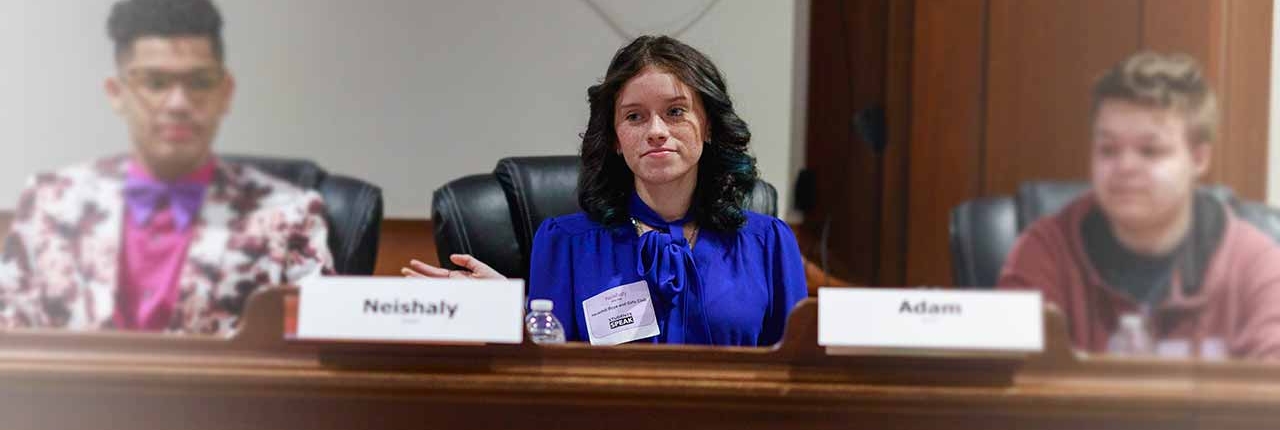 Hi. My name is Neishaly and I am a junior in high school. I want to talk about the importance of feeling safe at school and being in an environment that feels supportive and caring. I think all students should be able to attend schools that are safe. This is important to me because I feel like people don’t understand that things have changed in schools. Violence in schools is more common now.
Hi. My name is Neishaly and I am a junior in high school. I want to talk about the importance of feeling safe at school and being in an environment that feels supportive and caring. I think all students should be able to attend schools that are safe. This is important to me because I feel like people don’t understand that things have changed in schools. Violence in schools is more common now.
Last year, in my school, there were a lot of fights in the lunchroom and in the hallways. The school brought in police to help provide security. But upping security doesn’t help us feel safer, it scares kids. It can also provoke them to fight more and do worse things. Parents are even sometimes scared to send their kids to school because of this.
Another way that my school responded to the fights is that teachers became more strict about students being in the hallways during the passing periods. They have been issuing tardies and detentions for being in the hallways even a few seconds after the bell rings. Often the adults assume that students are late on purpose or that we are wasting time between classes. Sometimes this can be true, but there are also times that we are late to class because we are talking to a teacher, getting help, or because the locker jams. There can be a lot of reasons why students run a few minutes late to class and instead of assuming that we are breaking rules, I wish that adults would be more understanding and take the time to ask us.
Throughout the day, teachers tell us to sit down, they go over the rules, they only let you speak when you raise your hand. You can’t do this or that. You can’t speak your mind. You can’t talk out. You have to be quiet, sit there and just listen. But that doesn’t help prepare you for the real world. It teaches you to be obedient but it doesn’t teach you how to socialize with people, how to work out problems, and how to express what you need.
My instructional strategies teacher is different from this. He understands that we are young adults who are growing up. He remembers what it was like to be a young person. He talks to us about our life, he gets to know us and he always asks what we need or how he can help. He understands that we have other classes and other things that we have to make a priority. This helps my brain relax. I can focus and get work done. I feel comfortable and less anxious.
I think schools should find more ways to listen to students’ voices when they are making decisions about how to solve problems. Listening to students is important because it gives them a chance to speak their minds and be a part of making changes. Schools should provide opportunities for students to talk about making the kinds of changes that help kids feel comfortable and safer at school.
I would like to ask that you support Safe and Supportive Schools so that more schools will include students’ voices in making decisions.


 Hi. My name is Neishaly and I am a junior in high school. I want to talk about the importance of feeling safe at school and being in an environment that feels supportive and caring. I think all students should be able to attend schools that are safe. This is important to me because I feel like people don’t understand that things have changed in schools. Violence in schools is more common now.
Hi. My name is Neishaly and I am a junior in high school. I want to talk about the importance of feeling safe at school and being in an environment that feels supportive and caring. I think all students should be able to attend schools that are safe. This is important to me because I feel like people don’t understand that things have changed in schools. Violence in schools is more common now.

